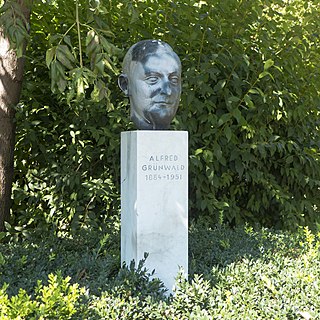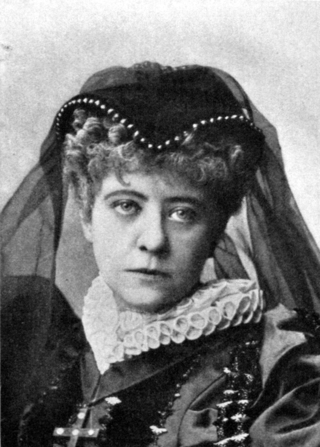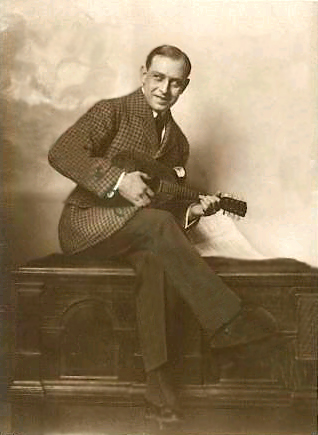
Die Herzogin von Chicago is an operetta in two acts, a prologue, and an epilogue. The music was composed by Hungarian composer Emmerich Kálmán with a libretto by Julius Brammer and Alfred Grünwald. It premiered in Vienna at the Theater an der Wien on April 5, 1928, and played for 372 performances. The work was presented in out-of-town tryouts in Newark, New Jersey and Springfield, Massachusetts by the Shuberts in 1929, but it did not make it to Broadway. The piece was forgotten until 1997, when the Lubo Opera Company performed it in concert in New York, after which Light Opera Works of Illinois performed the work in 1998 in a fully staged version with a new translation by Philip Kraus and Gregory Opelka. In 1999, Richard Bonynge made a recording of the work, which revived international interest in it.

Alfred Grünwald (1884–1951) was an Austrian author, librettist, and lyricist. Some of his better-known works were written in conjunction with the composers Franz Lehár, Emmerich Kálmán, Oscar Straus, Paul Abraham, and Robert Stolz.

Kurt Gerron was a German Jewish actor and film director. He and his wife, Olga, were murdered in the Holocaust.

Sybille Maria Christina Schmitz was a German actress.

Adele Sandrock was a German-Dutch actress. After a successful theatrical career, she became one of the first German movie stars.

Lya Mara was a Polish actress. She was one of the biggest stars of the German silent cinema.

Frederic Zelnik was an Austrian producer, director, and actor. He was one of the most important producers-directors of the German silent cinema. Zelnik achieved success through period operetta films in the 1920s and 1930s.

Grete Wiesenthal was an Austrian dancer, actor, choreographer, and dance teacher. She transformed the Viennese Waltz from a staple of the ballroom into a wildly ecstatic dance. She was trained at the Vienna Court Opera, but left to develop her own more expressive approach, creating ballets to music by Franz Schreker, Clemens von Franckenstein, and Franz Salmhofer, as well as dancing in her own style to the waltzes of Johann Strauss II. She is considered a leading figure in modern dance in Austria.

Olga Engl was an Austrian-German stage and motion picture actress who appeared in nearly 200 films.

Julius Falkenstein was a German stage and film actor of the silent era. He appeared in more than 180 films between 1914 and 1933. Falkenstein was Jewish, but secured a special permit to continue making films following the Nazi rise to power in 1933. He died of natural causes the same year, having made only one further film.

Julius Brammer was an Austrian librettist and lyricist. Some of his better-known works were written in conjunction with the composers Emmerich Kálmán, Oscar Straus, Leo Ascher, Edmund Eysler and Robert Stolz.

Olga Limburg was a German theater and film actress. She began her artistic career in 1901 with a commitment at the Municipal Theatre of Poznan. Since 1902, she played at several of Berlin's leading theaters including the Tribune, the Metropol Theatre, Berlin Lustspielhaus, the comedy and the Theater am Kurfürstendamm. During the early part of her theater career, Limburg usually played supporting roles. Later she worked in the "comical oldies" plays.

Margarete Kupfer was a German actress.

Lotte Neumann was a German film actress, screenwriter, and film producer.
Sophie Berg Pagay was an Austrian actress.
Robert Liebmann was a German screenwriter. Being of Jewish ancestry, he was one of the many that were murdered by the Nazis in 1942. During the occupation of France by the Nazis, Liebmann was arrested and sent to the Drancy internment camp. From there, the Nazis deported him to the Auschwitz concentration camp, where he was probably murdered immediately after his arrival.

Harry Halm was a German film actor.
Fanny Carlsen was a German screenwriter of the silent era. As she was Jewish she was likely forced to emigrate with the Nazi Party's coming to power in 1933, although her exact fate is unknown.

Anna Karenina is a 1920 German silent historical film, directed by Frederic Zelnik and starring Lya Mara, Johannes Riemann, and Heinrich Peer. It is an adaptation of Leo Tolstoy's 1877 novel Anna Karenina. It premiered at the Marmorhaus in Berlin.
Ruth Goetz was a German screenwriter active during the silent era. She was credited on more than 60 films over the course of her career.
















